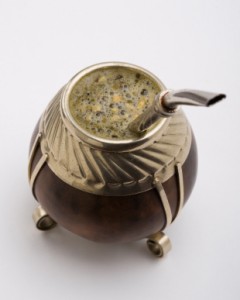 Have you heard of yerba mate? Made from dried, ground leaves and twigs of a tree indigenous to South America (Ilex paraguariensis), yerba mate is a caffeinated beverage that is steeped in hot water and drunk through a metal straw inserted into a dried gourd. This method of consuming yerba mate is known as mate cebado. Like coffee, tea and colas, yerba mate contains a stimulant (xanthine), and on average, contains about 330 mg of caffeine for every (1.5 quarts) consumed.
Have you heard of yerba mate? Made from dried, ground leaves and twigs of a tree indigenous to South America (Ilex paraguariensis), yerba mate is a caffeinated beverage that is steeped in hot water and drunk through a metal straw inserted into a dried gourd. This method of consuming yerba mate is known as mate cebado. Like coffee, tea and colas, yerba mate contains a stimulant (xanthine), and on average, contains about 330 mg of caffeine for every (1.5 quarts) consumed.
Why the interest? Well, coffee and consumption of caffeine have been linked to lower bone mineral density, accelerated bone loss and increased fracture risk, all major red flags for women as they age who become increasingly at higher risk for osteoporosis. Conversely, beverages like green and black tea, both of which have considerable caffeine content, are reportedly protective of bone. So, what about yerba mate and your bones?
In study in the January 2012 issues of Bone, researchers looked at the effect of yerba mate in postmenopausal women who drank at least a liter per day (prepared as mate cebado) for five years. These women were sedentary, did not smoke or also drink more than three cups of coffee or tea daily, were not on HRT or bisphosphonate therapy and used alcohol moderately. Yet, when they were compared to women of similar age and menopausal status who did not drink yerba mate, they were found to have higher bone mineral density levels at both the spine and hip. And, when researchers delved deeper, they found that only one other factor — body mass index — similarly and positively affected these BMD measures.
However, yerba mate contains high levels of xanthine, the same stimulant implicated in coffee’s detrimental effect on bone, implying that it wouldn’t be bone protective, right? A possible explanation for these positive bone effects is that yerba mate contains organic compounds, such as in particular, polpyphenols (antioxidant chemicals), flavonoids and alkaloids that may confer these positive benefits.
Before you start changing your caffeine habits, there are a few things that you need to know. Yerba mate has been linked to esophogeal and oral cancer and cancer of the larynx (although this may be associated with the temperature of the drink as well as the compound itself). Because it contains such a high level of stimulant, it may not be safe for people with high blood pressure who are especially sensitive to caffeine or who are taking blood pressure medications. Finally, there is some indication that in high doses, yerba mate can negatively affect the liver. So, it’s a beverage that’s best in moderation (take note lovers of Guayaki Organic Energy Shots!).
Me? I’m going to stick with my coffee habit and counteract any negative bone impact through weight bearing exercise. Still, it’s good to know that yerba mate may be an alternative worth looking into.







I read this with great interest because a) both my grandmothers–otherwise hale and independent–broke hips and 96 and began to decline after that and b) I DO drink yerba mate every day instead of tea or coffee.
This habit came about when I housed some Argentine bicyclists who were in town for a road race over a weekend. One had brought his yerba mate kit, including the gourd and metal straw, and showed me how it was prepared. He offered me a try–in Argentina, it’s a communal thing to do; everyone drinks from the same gourd, passing it around like a joint, apparently–and I was intrigued enough to hunt down a kit and a pound of the stuff myself.
I have to say, the preparation is elaborate, and no matter what I did I got bits of Yerba Mate in my drink, so over time I have switched over to use a tea strainer and make a tisane of it instead. I don’t drink a liter (!!!) a day–a cup or two usually–but I’ve come to really love the much more complex, slightly green, flavor over my former cuppa black tea, which now tastes flat to me.
And I’m thrilled to hope that it’s helping my bones! Whoo hoo!
That’s fascinating Mamie! I have never tried it but would love to.